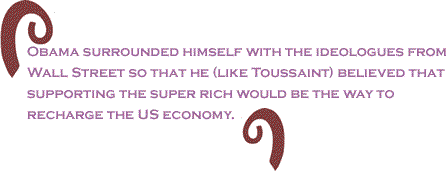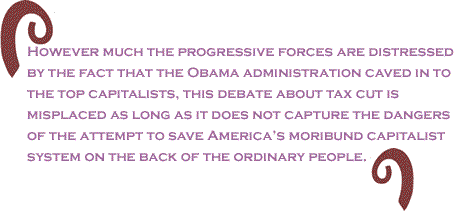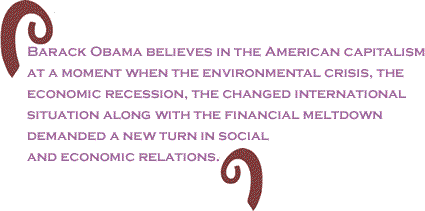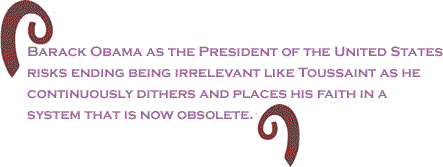In
revolutionary moments the laws, ideas and politics are
challenged by new circumstances. These circumstances force
the convergence of revolution and counter-revolution in
the same moment. New social forces emerge on the scene
and there are always leaders who are thrown up by the
moment. Oftimes these leaders are not themselves revolutionaries
but are caught up in the general convulsion that shakes
the foundations of the old society. Toussaint L’ Overture
was one such revolutionary in Haiti who joined the revolution
in 1793 and agreed that the old system of slavery must
end. But Toussaint believed in the plantation model and
wanted to restore the economic relations of the plantation
where the former enslaved were supposed to work for a
planter class.
Toussaint dithered when the people wanted a new mode of
economic organization and in the midst of these dithering
internal and external forces removed Toussaint and he
ended up as a tragic figure who emerged out of a revolution.
While Toussaint is still celebrated as a great revolutionary,
the tragedy of the bloodletting and stagnation of the
Haitian society cannot be separated from the fact that
as a political leader he could not grasp the reality that
the mass of the people wanted a new form of economic organization.
Barack Obama as the President of the United States risks
ending being irrelevant like Toussaint as he continuously
dithers and places his faith in a system that is now obsolete.
Barack Obama believes in the American capitalism at a
moment when the environmental crisis, the economic recession,
the changed international situation along with the financial
meltdown demanded a new turn in social and economic relations.

When
the Obama administration agreed with the leaders of the
Republican Party to extend the tax cuts for the wealthiest
US citizens for another two years, there was outrage within
the ranks of the progressive movement. This justifiable
outrage clearly focused on the fact that as a candidate
for the Presidency, Barack Obama had vowed that he would
not renew the tax cuts that had been instituted by George
W. Bush. No doubt, tax cuts for wealthy America is repugnant.
But however much the progressive forces are distressed
by the fact that the Obama administration caved in to
the top capitalists, this debate about tax cut is misplaced
as long as it does not capture the dangers of the attempt
to save America’s moribund capitalist system on the back
of the ordinary people. It is imperative that the debate
on tax cuts also grasp the larger picture on the paths
that are open to the society so that one can grasp the
increasing concentration and centralization of power in
the hands of a few. Only a few days ago it was none other
than the New York Times that outlined the
unlimited powers of the top nine banks that control the
derivatives market in an article entitled, “A
Secretive Banking Elite Rules Trading in Derivatives.”
Before
outlining the power of the top nine banks in this multi-trillion
gambling enterprise called derivatives, the Times noted,
“In theory, this group exists to safeguard the integrity
of the multi-trillion-dollar market. In practice, it also
defends the dominance of the big banks.” From this analysis
we were regaled with the absolute powers of these bankers
who were a law unto themselves to the point where we are
learning of their power from other Wall Street Bankers
who are excluded from this elite group.

The
legislation to extend the Bush tax cuts is coming at a
time when there are already talks about freeze in pay
rise for some workers, squeeze in social services for
working people, increased property taxes and other taxes
on the ordinary people. No gainsaying that the American
capitalist system is organized around the exploitation
of the poor, the working people, and the profligate consumerism
of the privileged class.
THE
BUSH TAX CUTS
The tax cut for the richest US citizens by George Bush
was one of the many ways in which the Bush administration
supported the richest one per cent of the population.
One estimate of this tax handout for the richest Americans
during the 8 years of the presidency shows that the wealthiest
400 Americans increased their wealth by over $380 billion.
Four hundred families increased their wealth by $380 billion.
This translates to an average of $1 billion give-away
to each of the richest 400 Americans. Senator Bernie Sanders
clearly spelt out the fact that during this period of
enriching the top income earners, the top Fortune 400
companies and families were further strengthened to dominate
the political and intellectual spaces. It was revealed
that the 400 richest Americans have accumulated $1.27
trillion in wealth.
The
Bush tax cut legislation titled, The Economic Growth
and Tax Relief Reconciliation Act of 2001 (EGTRRA),
was for ten years and was designed to end or revert
to the provisions that were in effect before it was passed.
EGTRRA was supposed to sunset on January 1, 2011
unless further legislation was enacted to pronounce otherwise.
By passing the $858 billion tax plan to extend the Bush
tax cuts, the Obama administration has joined with and
strengthened the forces of the US society who believe
that the rich should get richer regardless of what was
happening in the real economy. Inequality has skyrocketed
in the society to the point where by 2007, the top 1 percent
of all income earners made 23.5 percent of all income.
In his brilliant speech before the US Senate Bernie Sanders
held forth that
The
Obama administration attempted to justify the extension
with claims that that the compromise with the Republicans was
the only way to get the Republican Party to agree to a
13-month extension of unemployment benefits for millions
of Americans affected by the capitalist crisis. This was
a hollow claim because at no point during the past two
years did the Obama administration seek to educate the
mass of the population on the real consequences of the
sharp inequalities that enveloped the society since the
dismantling of the safety nets of the New Deal
of the last depression. There are those from the progressive
camp who argued that Obama did not do enough to mobilize
the ordinary working people against the Republican position
of tax cuts for the rich. However, Obama had surrounded
himself with the ideologues from Wall Street so that he
(like Toussaint) believed that supporting the super rich
would be the way to recharge the US economy.
TAXING
THE POOR FOR FREE LUNCH FOR THE WEALTHY
According to the United States Government Accountability Office ( GOA ), two
out of every three corporations in the United States paid
no Federal income taxes between 1998 and 2005. These corporations
had a combined $2.5 trillion in sales but paid no income
taxes to the IRS. In the book, Free
Lunch: How the Wealthiest Americans Enrich Themselves
at Government Expense (and Stick You with the Bill) , David Cay Johnson, explained in great details
the numerous subsidies granted to the capitalists. What
David Cay Johnson did not elaborate on was that on top
of the subsidies for insurance companies, banks, oil companies
telecommunications or pharmaceutical corporations, there
was the major subsidy of the trillions of dollars spent
on the military to protect this class. Despite the massive
subsidies, the recklessness and chaotic nature of economic
relations ensure that this system of capitalism generate
repeated and severe crises. Under social democratic capitalism,
there is a degree of social solidarity among the citizens
provide the conditions for more regulation over capitalist
enterprises and for there to be a higher degree of taxation
for the capitalists so that the state can invest in social
services such as health, education, social services and
infrastructure. US capitalists eschewed the social democratic
model of capitalism where there was regulation of the
rapaciousness of the top capitalists. The US opted for
the Friedrich August von Hayek version of capitalism
that is based on unlimited free enterprise. This is the
idea of trickle -down economics that believes that government
should leave the economy to private individuals, and that
cutting tax rates for the richest Americans will improve
the standard of living for the working class.
, David Cay Johnson, explained in great details
the numerous subsidies granted to the capitalists. What
David Cay Johnson did not elaborate on was that on top
of the subsidies for insurance companies, banks, oil companies
telecommunications or pharmaceutical corporations, there
was the major subsidy of the trillions of dollars spent
on the military to protect this class. Despite the massive
subsidies, the recklessness and chaotic nature of economic
relations ensure that this system of capitalism generate
repeated and severe crises. Under social democratic capitalism,
there is a degree of social solidarity among the citizens
provide the conditions for more regulation over capitalist
enterprises and for there to be a higher degree of taxation
for the capitalists so that the state can invest in social
services such as health, education, social services and
infrastructure. US capitalists eschewed the social democratic
model of capitalism where there was regulation of the
rapaciousness of the top capitalists. The US opted for
the Friedrich August von Hayek version of capitalism
that is based on unlimited free enterprise. This is the
idea of trickle -down economics that believes that government
should leave the economy to private individuals, and that
cutting tax rates for the richest Americans will improve
the standard of living for the working class.

Trickle down economics or supply-side economics is the old liberal version of
capitalism that maintained that laissez-faire will benefit
not just those well-placed in the market but also the
poorest. After the economic crash of 1929, this liberal
version of free enterprise was shelved only to re-emerge
in the era of Ronald Reagan where the neo-liberal version
of supply side thinking and economic planning was trumpeted
with the view that increases in real gross domestic product
are almost always good for the poor. According to this
neo-liberal concept of economics and politics, reducing
the top tax rate is supposed to lead to economic growth,
prosperity, and overall income growth for all through
the expansion of the economy with the creation of new
jobs. However as Senator Sanders clarified, during the
Bush years alone, some 48,000 factories shut down. The
US society went from 19 million manufacturing jobs to
12 million manufacturing jobs.
All of the evidence from the Bush tax cuts proved just the opposite to the logic
of trickle down economics. By every measure the economic
situation has deteriorated for the vast majority of the
population. This was at the same time when the top corporations
were sitting on 2 trillion dollars that they were hoarding
to use in the speculative market for derivatives.
Between 2001and 2003 the top 82 companies in the USA paid no income tax, though
they earned $102 billion in profits. The figures from
the Citizens for Tax Justice (CTJ) clarified that
instead of paying $35.6 billion in income taxes, as the
statutory 35 percent corporate tax rate seems to require,
these companies generated so many excess tax breaks that
they received outright tax rebate checks from the U.S.
Treasury totaling $12.6 billion. Overall,
data from the past 10 years strongly refutes any arguments
that cutting taxes for the richest Americans will improve
the economic standing of the lower and middle classes
or the nation as a whole. At the same time the top 1 percent
now owns more wealth than the bottom 90 percent. The US
also successfully exported this brand of neo-liberal economic
organization since the era of Ronald Reagan and Margaret
Thatcher. This was the counter revolutionary era when
the neo-liberal forces decided to wage an economic war
against the poor internationally. The election of Obama
was inspired by a revolutionary moment when the peoples
wanted a break from this brand of counter revolutionary
thinking.
The refutation of the trickle down philosophy as defended by President
Barack Obama and the Republicans was clearly articulated
by Senator Bernie Sanders of Vermont. Senator Sander stood
on the Senate Floor for eight hours to outline clearly
why another subsidy for the capitalist classes was not
needed in the midst of a ‘great recession.’ His eloquence
was backed up by the hard figures on the subsidies for
the top 2 per cent of the population, whose income has
tripled since 1970. Sanders spelt it out clearly that,
“It makes no sense to me to provide huge tax breaks for millionaires and billionaires
while we drive up the national debt that our children
and grandchildren will have to pay.”

The senator then went on to outline the trillions of dollars that have been
doled out in corporate welfare for the rich. What is significant
about this statement was the way in which Sanders, an
independent socialist senator brought to the fore the
reality that the tax cuts represent socialism for the
rich. This is how America taxes the poor to offer unneeded
free lunch to the wealthy.
SAVING
A MORIBUND CAPITALIST SYSTEM
Our present global realities show that American capitalism is a moribund system.
The tax cut for rich Americans is one symbolic effort
to save American capitalism. Capitalism proves itself
to be a system whose workings not only generate repeated
and often severe economic crises. It also systematically
shifts the costs of that instability down the social scale
to the majority in the middle and the bottom.
The current debate on taxes is indeed a distraction
from realities of both controllable and uncontrollable
factors related to the real economy and the "end"
of the US consumption led form of economic growth which
cannot be created again. Even if it could, the policies
of saving the banks and allowing the wealthy to accumulate
more wealth only makes it less likely that a consumption
based economy can be re-created. The debate about taxes
must transcend the revival of a moribund system. The debate
should be centered on how to organize society for ordinary
people and for the survival of planet earth.
A real debate on the economy needs to include a discussion of the massive military
expenditures and the deployment of over 800 military bases
around the world. This debate must also include a discussion
of the prison industrial complex and the opportunity costs
it places on society in terms of resources not invested
in education and the millions of youths who are prevented
from contributing to the real economy both in the short
term (while they are locked up) and over the long term
.
A real debate on the economy needs to include discussions about the fact that
for decades now, wages have stagnated while productivity
has gone up; but the benefits/profits were captured by
the wealthiest. This fact of the super profits is another
reason for the "break" in the ability of the
economy to have sufficient demand. Of course we
know that the only reason why this break did not cause
a crisis a decade ago, is that the financial sector was
able to create a "credit/debt" industries to
allow the society to maintain the myth of consumption
led growth, while at the same time having fewer total
workers and less total wage income. It was this financialization
of the system that hollowed out the real economy.
The financial crisis has forever broken this structure. The world has changed.
The realities of the current revolutionary moment dictate that
the sustenance of this economic mode of organization is
moribund. The urgency to address the global environmental
crisis; the beginning of the end of a unipolar world,
where the limitations of military might becomes more glaring;
as well as the increasing need for a shared humanity in
socio-economic organization of society are only few indicators
of the non-sustainability of American capitalism.
OBAMA
AND TOUSSAINT L’OUVERTURE
From all the economic analyses of 9 years of the tax cut, it is clear that the
wealth of the richest Americans did not trickle down to
the average America. Neither did it cushion the US capitalism
from the economic crisis. It is therefore counterintuitive
why the tax cut was an economic prescription. It is even
more alarming that despite the economic doldrums orchestrated
by the old policy characterized by this tax relief for
the wealthy, the Obama administration is extending it
by two more years. In the midst of the ‘economic recession,’
the tax breaks for the wealthy meant that the US society
is sliding away from the model of safety net for the
poor that was carved into the Social Security system of
the New Deal. With every day of the economic crisis there
is a further shift to an even more unjust economic system
where it shifts more of its tax burden onto the shoulders
of the majority of the working peoples, especially those
at the bottom of the economic ladder. Along with this
burden is the added confusion where sections of big capital
mobilize poor whites to organize against their own interests.
The political mobilization of the conservative forces
have been so successful that the discussions on the Bush
Tax cuts are carried out to bamboozle the ordinary people
and to confuse the working people.

As
Barack Obama is trapped by the ideal of liberal economic
theory, a major question is whether he can save capitalism.
Even a more urgent question is: like Toussaint attempted
to take Haitians back to the plantations, would Obama’s
attempt to save capitalism not take ordinary people back
to the era of ultra-Reagonomics along with the cowboy-like
military adventures? What is the moral justification for
trying to save a moribund system by pleasing the financial
oligarchs at the expense of the working people and planet
earth? A serious concern is that if Obama displeases the
people to please the capitalists, and yet is unable to
satisfactorily please them he may end up like Toussaint
L’Ouverture.
The capacity to reverse the political and economic power of the wealthiest US
citizens and ensure that Obama does not end up like Toussaint
depends on a level of political mobilization that has
not yet been contemplated by even those critical of the
administration.

BlackCommentator.com Editorial Board Member, Dr. Horace Campbell,
PhD, is Professor of African American Studies and Political
Science at Syracuse University in Syracuse New York. He is the author of Barack Obama and Twenty-first Century Politics: A Revolutionary
Moment in the USA. Click here to contact Dr. Campbell.

